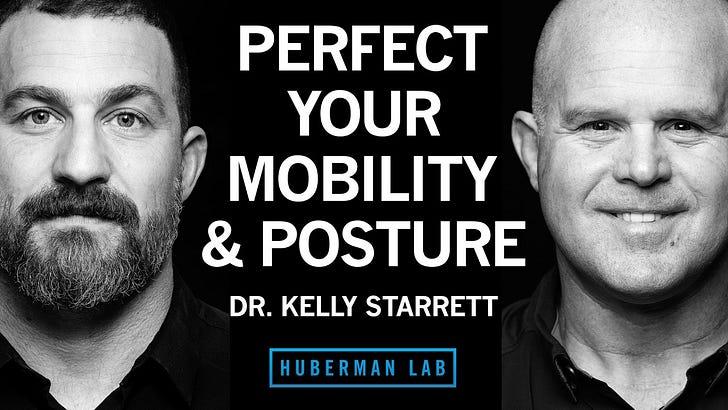Huberman recently sat down with Dr. Kelly Starrett to discuss training, nutrition, and mental health as we age. The interview is great, albeit over 3 hours long, but there were a handful of key points that stood out for me, and I had some thoughts on each of them:
1. It is NOT normal for strength and mobility to decrease with age.
We know how to build strength: you have to load tissue with resistance of some kind. And we know how to maintain mobility: you have to repeatedly perform specific movements, going into ranges of motion that you don’t achieve when sitting still. If people are sedentary as they age, no doubt strength and mobility will decrease…pretty basic. Why, then, do we see so much strength and mobility loss in clients over the age of 30 even if they keep exercising?
The answer: clients might keep exercising and moving, but they aren’t doing it appropriately. Most active people will continue to do what they have always done, regardless of their current age. They certainly overtrained when they were young, but they got away with it since their tissue was pliable, hydrated, and quick to recover. As tissue ages it loses resilience, so traditional overtraining leads to stiffness, pain, injury, and finally inactivity. Until clients learn to train smart and appropriately for the age of their tissue, they’ll repeat this overtraining-injury pattern and become less active with age.
It’s hard for some people to buy into the fact that if you train with less volume and intensity (compared to when you were 25) you will get much better results. Maintaining strength and mobility as we age is much easier once pride and stupidity are out of the picture.
2. “Fitnessing” is not Training.
Dr. Starrett says “fitnessing” like I would say “junk training”. Whether you are going to spin class, high intensity boot camp, marathon training, ask youself “What am I training for?” Is it to achieve a certain look/body weight? Are you trying to get better at something? Or, are you just exercising to exercise?
This type of mindless activity can certainly be fun and social, but is your excessive tissue loading making you more resilient or just beating you down? If you play a sport, competition events should be your high-intensity work, not your training. If your sport is life, life ends up being high-impact enough: there is no point in beating yourself up in the gym. Training should actually make you more resilient to face sport and life, decreasing your risk of injury and making you feel better.
People work hard at “fitnessing” to lose weight, build muscle, and manage stress, but when the loads are too high they actually increase stress hormones and gain weight. That’s frustrating, so they exercise harder until injury finally strikes. Before long exercise gets equated with pain and injury, and people stop training altogether.
3. “Be consistent, don’t be a Hero” - Dr. Starrett
This quote really speaks to me. One of my long-time clients always says: “Life is not about big windfalls, it’s about stacking your nickels.” Key advice, and I view training the same way. Massive workouts where you push all-out and have nothing left are not what move the needle. We need steady, manageable loads that are periodized throughout the year to give our bodies time to adapt and recover. Reserve your max, all-out efforts for sport and life. We train so that we can keep up this “push” on a regular basis without giving up the activities that we love.
4. Train Together
No sport or exercise is as enjoyable if we’re alone, and this doesn’t just apply to team sports. I always take this for granted since I exercise with clients on a daily basis. Our bond is greater if we work together toward our training goals. We can push each other, yes, but that’s not really the point. We aren’t trying to do more work, we are trying to enjoy our training more. Enjoyment of training is far more important than the amount of work that gets accomplished. My body adapts much faster when I’m happy, fulfilled, and well rested.
It’s refreshing to hear Dr. Starrett profess these training philosophies since he’s at the top of the game in collegiate coaching. Definitely watch the full interview, as you might pick up on different aspects than I did. Just remember: today’s workout isn’t the last one you’ll get - take your time, train smart, and stack your nickels.
Sam





